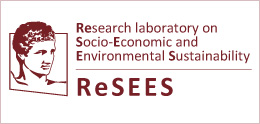NEWSLETTER September 2020 – December 2020
Dear Readers,
In this issue, we present the latest news for the period from September 2020 to December 2020 for our Cluster on Sustainability Transition.
Enjoy the reading!
Maria Lentoudi, Communications Manager, Cluster on Sustainability Transition, PhD Candidate, Panteion University
COVID 19 pandemic-related recovery packages are financed by national debt, which means that they are loans from the future generations. This points to a moral responsibility of the current generation, for “Building back Better” by investing, beyond fiscal stimulus, in transformative public investments, which will trigger the exponential systemic change needed, while leveraging private sector investment, to face the climate crisis, the economic crisis and the health crisis and enable a transformative green and digital, job-based and fair recovery from COVID-19 Pandemic, which will be co-designed by all relevant stakeholders: politicians, policy-makers, researchers, innovators, technology developers, businesses, NGOs and the civil society.
The good news is that there is, in addition to a moral obligation, an economic case for “Building Back Better”. Recent simulations of the effect of green recovery plans worldwide confirm that a green economic stimulus is more growth-enhancing than a ‘return-to-normal’ stimulus that would merely boost the unsustainable current consumption and production patterns. Cleaning unsustainable supply chains and production processes that lead to deforestation and biodiversity threats, can help reduce the risk of future zoonotic diseases and pandemics. Investing in climate resilience reduces the risk of extreme weather events and poverty for hundreds of millions of people.
The United Nations Secretary-General António Guterres, in his recent special address on “The State of the Planet” (12 December 2020), underlined that the main drivers for a trans-formative recovery are (1) global climate neutrality by 2050 (including technological advances, circular economy and nature-based solutions) (2) Sustainable Finance and (3) Climate Adaptation and Resilience. The 2030 Agenda and the Paris Agreement provide the long-term vision and blueprints for developing the transformation pathways. The European Green Deal provides the right level of ambition and direction and where efforts have been made to align the investment framework for a green and digital recovery.
In this respect, ensuring a successful biodiversity COP in Kunming, a climate COP in Glasgow and the World Food Summit in Copenhagen is essential for coordinated actions on climate and biodiversity. Combined with other annual meetings (UNGA, G20, HLPF etc.) these can make 2021 the “super year for nature and climate” and can set the foundation for long-term international cooperation on the transformative change that integrates the environment.
During 2020, our “Cluster on Sustainability Transition”, composed of 90 researchers, coordinated and/or participated in 30 national, European, and global projects, won one ERC (European Research Council) and three new Horizon 2020 projects, published 1 book and 30 peer reviewed scientific publications, organised/co-organized/participated in 133 international and national events, and most importantly collaborated worldwide with more than 400 scientific and innovation institutions, hundreds of businesses and more than 40 governments, aiming at enabling of the needed transformative change for a sustainable recovery.
Prof. Phoebe Koundouri
28.12.2020




 Πατησίων 76
Πατησίων 76 30 2108203 455
30 2108203 455
